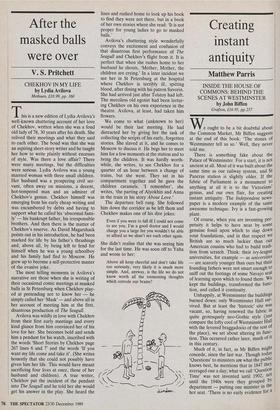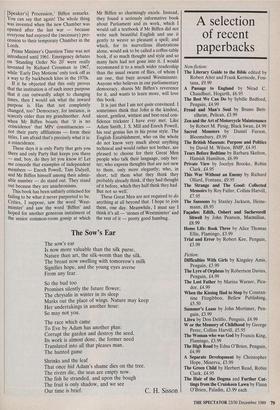Creating instant antiquity
Matthew Parris
INSIDE THE HOUSE OF COMMONS: BEHIND THE SCENES AT WESTMINSTER by John Biffen
Grafton, £16.95, pp.237
Wought to be a bit doubtful about the Common Market, Mr Biffen suggests at the end of this book: 'The stones of Westminster tell us so.' Well, they never told me.
There is something fake about the Palace of Westminster. For a start, it is not ancient at all. Most of it was built about the same time as our railway system, and St Pancras station is slightly older. If the fabric of Parliament is a monument to anything at all it is to the Victorians' genius, and our own flair, for creating instant antiquity. The Independent news- paper is a modern example of the same awesome technique. Ivy is a fast-growing plant.
Of course, when you are inventing per- petuity it helps to have near by some genuine fossil upon which to slap down your foundations, and in that respect we British are so much luckier than our American cousins who had to build tradi- tion from scratch. Think: their ivy-league universities, for example — as universities — are scarcely younger than ours but their founding fathers were not smart enough to sniff out the footings of some Navajo seat of learning upon which to found them. We kept the buildings, transformed the func- tion, and called it continuity. Unhappily, at Westminster the buildings burned down: only Westminster Hall sur- vived. But at least the 'historic' site was vacant, so, having renewed the fabric in quite grotesquely neo-Gothic style (just compare the lofty cool of Westminster Hall with the fevered braggadocio of the rest of the place), we set about altering its func- tion. This occurred rather later, much of it in this century. Much of it, in fact, as Mr Biffen might concede, since the last war. Though today `Questions' to ministers are what the public knows best, he mentions that in 1847 they averaged one a day; what we call 'Question Time' was not invented until 1902; not until the 1940s were they grouped by department — putting one minister in the hot seat. 'There is no early evidence for a [Speaker's] Procession,' Biffen remarks. You can say that again! The whole thing was invented when the new Chamber was opened after the last war — because everyone had enjoyed the (necessary) pro- cession to their temporary Chamber in the Lords.
Prime Minister's Question Time was not Introduced until 1961. Emergency debates on 'Standing Order No 20' were really invented by Richard Crossman in 1967, while 'Early Day Motions' only took off as a way to fly backbench kites in the 1970s.
If it be objected that this only proves that the institution is of such inner purpose that it can outwardly adapt to changing times, then I would ask what the inward purpose is. Has that not completely changed, too? Democracy, for instance, is scarcely older than my grandmother. And when Mr Biffen boasts that 'it is no coincidence' that MPs' constituencies not their party affiliations — form their titles, I am afraid that's precisely what it is: a coincidence.
These days it is only Party that gets you there and only Party that keeps you there — and, boy, do they let you know it! Let me concede that examples of independent members — Enoch Powell, Tam Dalyell, and Mr Biffen himself among their admir- able number — do stand out. They stand out because they are anachronisms.
This book has been unfairly criticised for failing to be what it never purported to be. Critics, I suppose, saw the word 'West- minster' and saw the word `Biffen' and hoped for another generous instalment of the senior common-room gossip at which Mr Biffen so charmingly excels. Instead, they found a seriously informative book about Parliament and its work, which I would call a textbook if Mr Biffen did not write such beautiful English and use it gently to weave so pleasant a spell; and which, for its marvellous illustrations alone, would ask to be called a coffee-table book, if so much thought and style and so many facts had not gone into it. I would recommend it to a much wider readership than the usual swarm of flies, of whom I am one, that buzz around Westminster. Anyone who believes in our parliamentary democracy, shares Mr Biffen's reverence for it, and wants to learn more, will love this book.
It is just that I am not quite convinced. I sometimes think that John is the kindest, nicest, gentlest, wittiest and best-read con- fidence trickster I have ever met. Like Adam Smith, J. S. Mill and Enoch Powell, his real genius lies in his prose style. The English Establishment, who on the whole do not know very much about anything technical and would rather not bother, are pleased to choose for their Great Men people who talk their language, only bet- ter; who express thoughts that are not new to them, only more elegantly; who, in short, tell them what they think they probably already think, if they had thought of it before, which they half think they had. But not so well.
These Great Men are not required to do anything at all beyond that. I hope to join them, one day. Meanwhile, I must say I think it's all — 'stones of Westminster' and the rest of it — pretty good humbug.











































































































 Previous page
Previous page